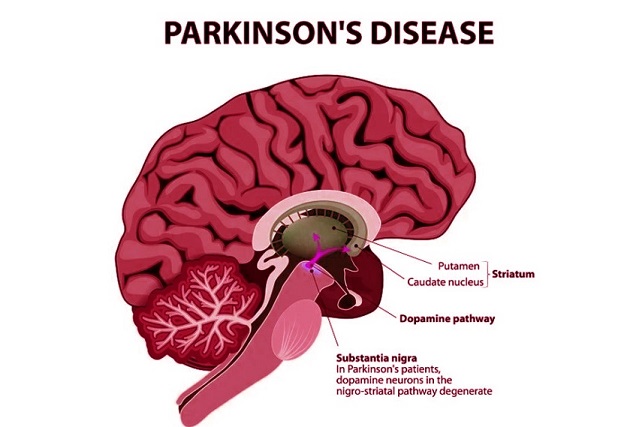Nikhil Prasad Fact checked by:Thailand Medical News Team Sep 19, 2025 5 months, 5 days, 22 hours, 26 minutes ago
Medical News: Understanding the Threat of Parkinsons
Parkinson’s disease is the second most common neurodegenerative disorder worldwide. It primarily affects people over the age of 55, and most patients are diagnosed with the idiopathic form, where the exact cause remains unknown. The disease is marked by the loss of dopamine-producing neurons in a brain region called the nigrostriatal system. Standard treatment with L-dopa can control symptoms, but after several years, many patients experience severe side effects. Despite decades of research, no therapy has been able to stop or slow down the disease’s gradual progression.
 Natural Compounds in Food May Protect Against Parkinsons
Natural Compounds in Food May Protect Against Parkinsons
According to researchers from the Escuela de Tecnología Médica, Facultad de Salud, Universidad Santo Tomás, Chile, and the Molecular & Clinical Pharmacology, ICBM, Faculty of Medicine, University of Chile, a different approach may lie in diet and naturally occurring compounds. This
Medical News report looks into how certain foods and nutrients could strengthen the brain’s defense system and possibly lower the risk of Parkinson’s.
The Role of a Hidden Neurotoxin
Scientists believe that a chemical called aminochrome, naturally formed during the brain’s production of neuromelanin, could play a key role in the slow loss of neurons seen in Parkinson’s. Unlike external toxins that damage large areas quickly, aminochrome affects one neuron at a time, causing a very gradual decline. Thankfully, the body has protective enzymes—DT-diaphorase and glutathione transferase M2-2—that normally neutralize aminochrome’s toxic effects. However, when these protective systems weaken or are overwhelmed, neurons become more vulnerable, leading to Parkinson’s symptoms over many years.
How Food Compounds Can Help
The study highlights that certain natural bioactive compounds in food can stimulate the KEAP1/NRF2 pathway, which in turn increases the production of protective enzymes. For instance, omega-3 fatty acids like DHA and EPA, commonly found in salmon, sardines, and other fatty fish, have been shown to boost these defenses. Another powerful compound, astaxanthin—a red pigment found in salmon, krill, and algae—also enhances the brain’s ability to neutralize aminochrome’s harmful effects.
Beyond fish, many fruits, vegetables, herbs, and even coffee contain compounds with protective potential. Examples include curcumin from turmeric, resveratrol from red wine and grapes, quercetin from apples and onions, and chicoric acid from chicory. These plant-derived compounds act as antioxidants, reduce inflammation, and may even prevent the harmful clumping of proteins that worsen Parkinson’s. Some, like wolfberry and citrus flavonoids, have shown improvements in both motor and cognitive functions in animal studies.
Implications for Everyday Life
The findings suggest that everyday die
tary choices could play a preventive role against Parkinson’s. By regularly consuming foods rich in omega-3 fatty acids, flavonoids, polyphenols, and other bioactive compounds, people may be able to strengthen their natural defenses against the slow neuron damage that defines the disease. Although these are not cures, and more research is needed to confirm their benefits in humans, the evidence points toward diet as an important factor in reducing risk.
Conclusion
The research reinforces a growing belief that Parkinson’s disease may be slowed or even partly prevented by boosting the brain’s own defenses. Natural compounds in food, especially omega-3 fatty acids and plant-based antioxidants, seem capable of activating key protective pathways that shield neurons from internal toxins like aminochrome. While no single food can eliminate the risk, a diet rich in fish, fruits, vegetables, and certain herbs may be an accessible and natural way to guard brain health. This approach represents a hopeful and practical avenue for prevention at a time when no effective disease-halting drugs exist.
The study findings were published on a preprint server and are currently being peer reviewed.
https://www.preprints.org/manuscript/202509.0025/v1
For the latest on Parkinson’s disease, keep on logging to Thailand
Medical News.
Read Also:
https://www.thailandmedical.news/news/common-blood-test-can-reveal-hidden-risk-of-parkinson-s-disease
https://www.thailandmedical.news/news/spike-protein-from-covid-19-can-speed-up-parkinson-s-disease
https://www.thailandmedical.news/news/indonesian-study-reveals-powerful-potential-of-n-acetylcysteine-nac-for-parkinson-s-disease
